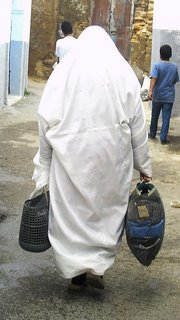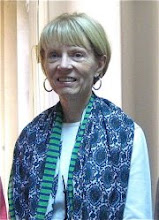The Only American
 Since I’ve left Tunis, I’ve not seen any other Americans. I do hear English spoken occasionally, however, because tourists from the United Kingdom visit the resort areas. In general, most tourists are from France and Germany. Tunisians are delighted to meet an American and express the desire to learn English. They like to hear “American English,” probably due to the U.S. role in the world. Many Tunisians ask why more Americans don’t visit their country.
Since I’ve left Tunis, I’ve not seen any other Americans. I do hear English spoken occasionally, however, because tourists from the United Kingdom visit the resort areas. In general, most tourists are from France and Germany. Tunisians are delighted to meet an American and express the desire to learn English. They like to hear “American English,” probably due to the U.S. role in the world. Many Tunisians ask why more Americans don’t visit their country. Personally, being the lone American means I get to speak French and Arabic and intermingle with the local population more. It gives me an added sense of adventure, of charting a unique course, exploring unfamiliar waters. With almost nowhere on the planet truly unknown, this is in large part a myth. Still it makes my sabbatical more exciting. In an Internet search, I found pictures from all throughout the country and a travelogue in English. It turns out the couple was from Canada and both spoke French. Consequently, I am involved in an out-of-the-ordinary journey for the average American.
An interesting fact is that I’m seldom asked if I am alone here, unless it is a question of how many people to seat. I’ve come to think that how many times I’m asked this may be an indication of the safety and openness of a country. Tunisia is a very safe country and well accustomed to playing host to European tourists. Outside of hotels, modesty in dress for men and women would be advised. In the high tourist areas, I have seen couples strolling hand in hand. Physical contact in public between members of the opposite sex is not considered proper in most of Tunisia.
Nabeul
Nabeul is the regional seat of government for Cape Bon and less touristy than Hammamet, whose sole reason for being seems related to the trade. The Friday Market in Nabeul, nonetheless, has become part of the sightseeing circuit. The city claims to be Tunisia’s capital of pottery. Most crafts practiced in Tunisia seem to be produced quickly for the tourist trade. As a middle-income country, the educational and skill level of the populace has most likely outpaced extensive investment in traditional skills.
More Tunisians in traditional dress are visible in Nabeul. Many women are wearing the jellabah or wrapped in a large piece of white material that is drawn around the waist, then across the shoulders, and over the head. Older men may wear a brown wool jebba (long gown with large sleeves) trimmed in black embroidery with hood now that it’s cooler. A lot of people, especially the young, wear modern Western wear, take-offs on famous fashion lines, sunglasses, and stylish handbags. Women who were doing serious shopping came from markets near or in the medina, to some extent more authentic, the merchants less insistent.
National Union of Tunisian Women: Regional Branch
The reason I went to Nabeul was to visit the regional branch of the Union National de la Femme Tunisienne, which is located there. It’s located on Habib Bourguiba Avenue, across from the post office and next to a mosque. The president is Yosra Ayed, also an inspector of lycées. The office is in the same building as one of 11 kindergartens (jardins d’enfants), which the Nabeul branch of the UNFT oversees. The facilities were simple but clean and bright, seemed well run, with the children happy and secure. UNFT is also involved in many other areas, such as professional alliances, illiteracy classes, training centers, and legal assistance. An administrative assistant was proud to point out that Tunisia is the only Arab country, which makes polygamy illegal.


0 Comments:
Post a Comment
<< Home